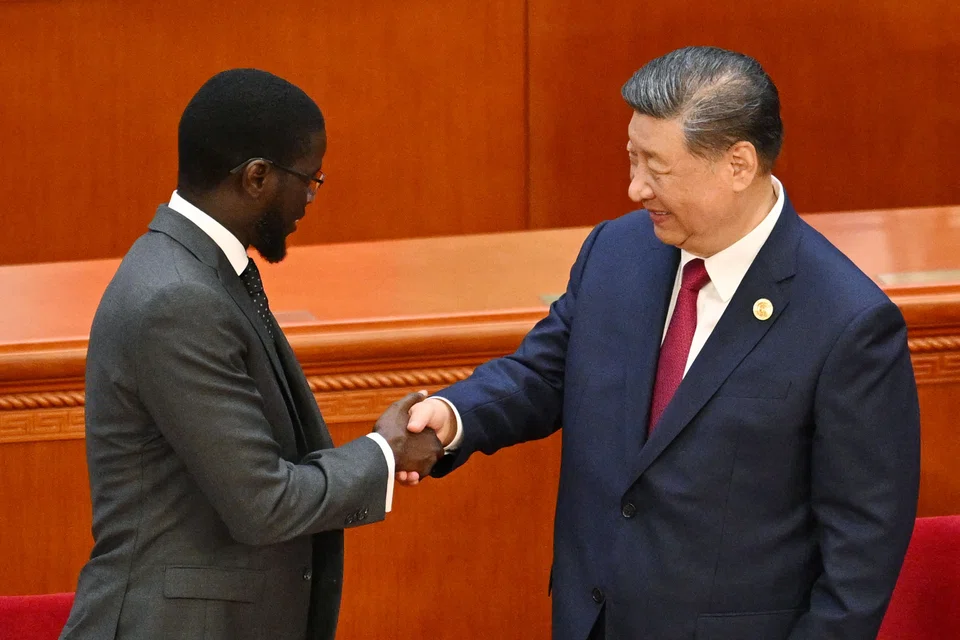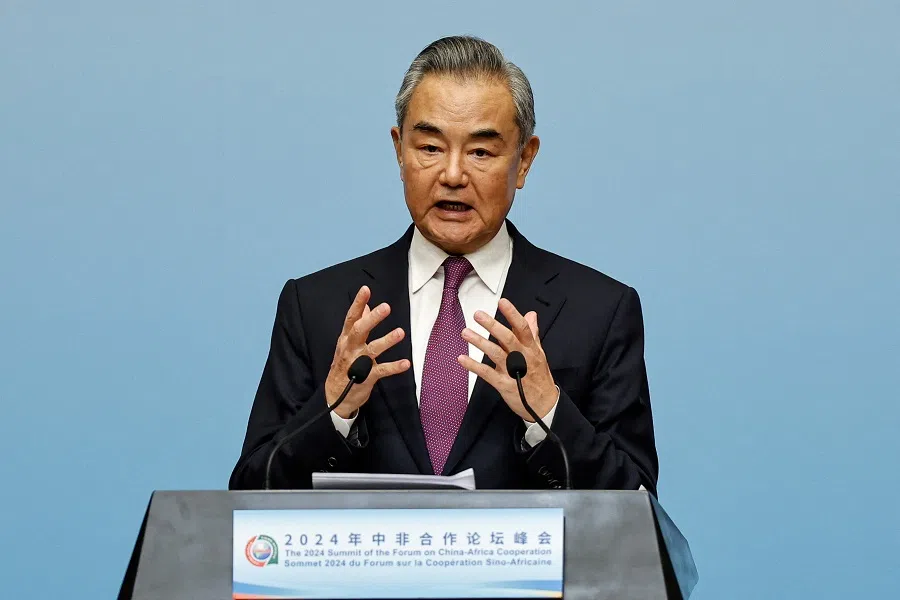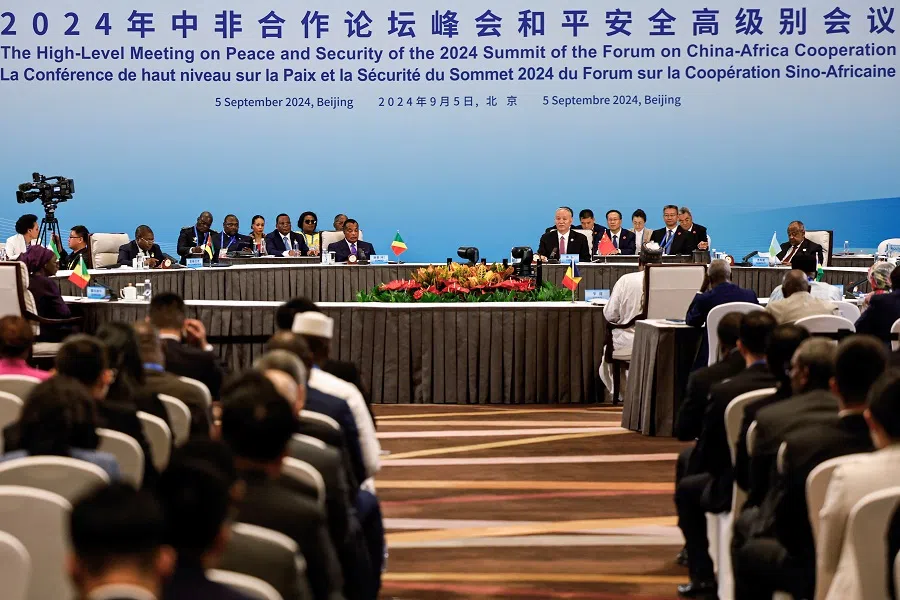China expands footprint in Africa amid declining US security presence
Feeling pressure from the wave of instability throughout Africa and the need to safeguard its interests in the BRI, China is going to greater lengths to establish a larger security presence in Africa, says academic Alessandro Arduino.

Since the first Forum on China-Africa Cooperation (FOCAC) in 2000, China’s role and interests in Africa have evolved significantly. Meanwhile, the continent has experienced increasing uncertainty and instability, mirroring global trends.
The ninth FOCAC forum, which began on 4 September under the slogan “Joining hands to advance modernisation and build a high-level China-Africa community with a shared future”, reflects China’s ambition to lead the global south, revive the Belt and Road Initiative (BRI) and expand its geopolitical influence from Cape to Cairo.
While mineral extraction remains central to Beijing’s strategy, its promise to collaborate on technology, health and green energy without a condescending attitude has resonated with African partners.
Renewable energy taking centre stage
Chinese President Xi Jinping’s pledge of US$50 billion is a promising start, coming at a time of economic turmoil, and it is not by chance that it found a receptive audience among the 51 African leaders who gathered in Beijing to discuss future cooperation. While mineral extraction remains central to Beijing’s strategy, its promise to collaborate on technology, health and green energy without a condescending attitude has resonated with African partners.
As renewable energy is taking centre stage with the promise of numerous clean energy projects across the continent, China is shifting away from exporting exclusively manufactured goods to Africa, instead focusing on growing sectors like high-value agriculture and locally-based advanced manufacturing for export.
As the largest lender to African nations, China’s approach to debt relief was only briefly addressed at the forum, however, it highlighted a shift toward a more pragmatic lending policy less centred on debt-driven infrastructure investments.
That does not mean that Chinese companies will not profit from the situation. As China’s domestic economy struggles to fully recover, several state-owned enterprises as well as private ones — from those dealing with concrete production to fibre optics cables — are increasingly finding the African market more profitable than their own.
While Beijing is not yet ready to abandon its principle of non-interference, its rise to becoming the largest arms supplier in sub-Saharan Africa indicates a shift in its strategy and the move has not gone unnoticed in Washington.
Widespread instability across Africa a concern
Nevertheless, peace and security in many African states have deteriorated due to worsening socioeconomic crises, coups, armed banditry, terrorism and other transnational threats, leading to widespread instability across the continent. Also, geopolitical rivalries among major and emerging powers vying for influence in Africa have only added fuel to the fire. The Russian Wagner Group mercenaries in the Sahel region, Turkey and the Gulf monarchies from Libya to Somalia are a case in point.

China’s approach to security, however, has shifted since two decades ago when the priority was economic cooperation and foreign direct investments. The notion that sustainable development alone could ensure security and stability has been challenged by the worsening security situation, including ongoing civil wars in Libya and Sudan, the expansion of local and international terrorist networks from Somalia to Nigeria, and a rise in transnational criminal activities.
In response to this growing instability, China has expanded training programmes for local armed forces and police officers, as well as joint military exercises. The recent FOCAC pledging a US$140 million military grant or security initiatives marks a further step in China implementing the Global Security Initiative partnership in Africa, but it is a tiny portion compared to the overall economic package. This funding will be used to fund initiatives including training 6,000 military personnel and 1,000 law enforcement officers, as well as bringing 500 young African military officers to China for training.
While Beijing is not yet ready to abandon its principle of non-interference, its rise to becoming the largest arms supplier in sub-Saharan Africa indicates a shift in its strategy and the move has not gone unnoticed in Washington. According to Bloomberg, the US is preparing an economic and security assistance package for Gabon to prevent China from establishing a military presence in the strategically located Central African country. While the security situation is becoming increasingly challenging for China, it is even more complex for the US.
... Beijing’s growing security presence in Africa appears set on three pillars: expanding military training and cooperation, increasing arms sales and strengthening its private security sector.
China can no longer free-ride under US security umbrella
Several countries in the Sahel region, from Mali to the Central African Republic, have expelled Western military forces that were stationed there to counter insurgent threats. Niger and Chad are the most recent countries to reject Western military assistance programmes showing the door to US and French troops.
As a byproduct, China can no longer freely ride under the US security umbrella as it did in the past as the US security footprint in the region has been significantly reduced. A notable example is the closure of the US$100 million combat drone base the US operated in Niger, which was used to monitor and carry out targeted strikes against terrorist threats in the region.

In reaction to the evolving situation, Beijing’s growing security presence in Africa appears set on three pillars: expanding military training and cooperation, increasing arms sales and strengthening its private security sector. Meanwhile, Washington is bent to dissuade other African countries from following Djibouti’s example of allowing China to establish permanent military bases.
Meanwhile, Beijing’s geoeconomic strategy unfolds across two fronts. On the one hand, China is advancing multilateral initiatives like BRICS and SCO connecting Africa and Central Asia with the Middle East and Southeast Asia. On the other, it is deepening bilateral ties, expanding its focus beyond economics to include security cooperation.
At the recent FOCAC, China reaffirmed its commitment to bolster African nations’ defences; just days later, along the same vein, China’s Minister of Public Security Wang Xiaohong echoed this message during the first public security summit with Central Asian counterparts, underscoring the call for stronger security collaboration to safeguard the BRI.





